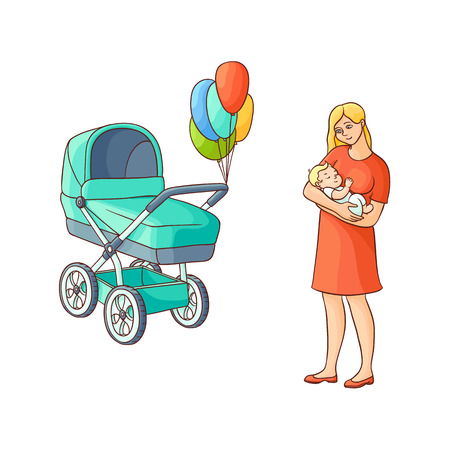Introduction to Newborn Sleep in the UK
For many British parents, the arrival of a newborn brings immense joy alongside a fair share of challenges—especially when it comes to sleep. Understanding typical newborn sleep patterns is crucial for establishing healthy routines and managing expectations during those first few months. In the UK, where seasonal changes, household structures, and cultural practices may influence daily life, knowing what’s normal can make all the difference in supporting both your baby’s well-being and your own peace of mind.
Newborns typically sleep between 14 and 17 hours per day, but their sleep is spread out in short stretches—usually two to four hours at a time—because their tiny tummies need frequent feeds. This fragmented sleep can be tough on parents, but it’s a natural part of early development. By recognising these patterns and understanding how British norms around bedtime routines, safe sleeping environments, and family support differ from other countries, parents can make informed choices that foster healthy habits from the start.
| Age | Total Sleep (hours) | Daytime Naps | Night-time Sleep |
|---|---|---|---|
| 0–3 months | 14–17 | 4–6 naps | 8–9 hours (interrupted) |
| 3–6 months | 12–15 | 3–4 naps | 9–10 hours (less interrupted) |
By gaining an overview of these typical sleep cycles and why they matter in the context of British parenting, mums and dads can better prepare for the journey ahead—navigating night wakings, feeding cues, and creating a nurturing environment unique to their family’s needs.
2. How Much Sleep Do British Newborns Need?
Understanding how much sleep your newborn needs is crucial for supporting healthy growth and development. According to the NHS and UK health guidelines, newborns generally require more sleep than any other age group. In their first few weeks, most British newborns will sleep for approximately 14 to 17 hours within a 24-hour period, though some may need up to 18 hours. It’s important to note that this sleep is often divided into shorter periods, both day and night, as their feeding and nappy changing needs interrupt their rest.
| Age | Recommended Total Sleep (per 24 hours) |
|---|---|
| 0-3 months | 14-17 hours |
| 4-6 months | 12-16 hours |
These figures are general recommendations; every baby has unique sleep patterns. Some British parents might notice their newborn sleeping more or less than these averages, which can be perfectly normal unless accompanied by signs of discomfort or health concerns. If you’re ever unsure about your baby’s sleep duration or quality, consult your health visitor or GP for tailored advice in line with UK standards.

3. Common Sleep Behaviours and Challenges
Newborn sleep in the UK often leaves parents feeling both amazed and exhausted, as tiny infants rarely follow a predictable routine. Understanding what is normal can help British families navigate this unique phase more confidently. Most newborns experience short sleep cycles, typically lasting between 30 to 50 minutes. Unlike adults, they spend more time in lighter stages of sleep, making them prone to waking frequently—especially during the night. This pattern is not only natural but also serves an important developmental purpose.
Night waking is perhaps the most common challenge faced by new parents across the UK. It is entirely normal for babies to wake every two to three hours for feeding, comfort, or nappy changes. The unpredictability can be tough on even the most prepared family, particularly when paired with fussiness or difficulty settling back down after a feed. To better understand these behaviours, consider the following table:
| Common Behaviour | Description | Practical Tip (UK context) |
|---|---|---|
| Night Waking | Waking every few hours for feeds or comfort | Keep lighting dim and voices low during night feeds to encourage calmness |
| Short Sleep Cycles | 30-50 minute cycles; frequent stirring or waking | Consider using white noise machines or blackout blinds, popular among UK parents |
| Fussiness | Crying or restlessness before sleep or after waking | Swaddling or gentle rocking can soothe; remember safe sleep guidelines from NHS |
It’s worth noting that seasonal factors unique to the UK—such as longer daylight hours in summer or chilly evenings—may affect your baby’s sleep routines. Many British families find that establishing a consistent bedtime ritual, such as a warm bath followed by a lullaby, helps signal to their newborn that it’s time to wind down, regardless of the season.
4. Safe Sleep Practices in the UK
Ensuring your newborn’s sleep environment is safe is a top priority for every British parent. Following evidence-based advice from the NHS and The Lullaby Trust significantly reduces the risk of Sudden Infant Death Syndrome (SIDS) and supports healthy development. Here are key recommendations for creating a secure sleep setting tailored to UK homes:
Recommended Safe Sleep Environment
| Factor | NHS & Lullaby Trust Guidance |
|---|---|
| Sleep Position | Always place your baby on their back to sleep, both at night and during naps. |
| Sleep Surface | Use a firm, flat, waterproof mattress in a cot, crib, or Moses basket that meets British safety standards. |
| Bedding | Avoid duvets, pillows, soft toys, and loose bedding. Use only a fitted sheet and consider baby sleeping bags that fit well. |
| Room Sharing | Keep your baby’s cot in your room for at least the first 6 months. |
| Room Temperature | Maintain 16–20°C (60–68°F) and check your baby isn’t too hot or cold. Avoid using electric blankets or hot water bottles. |
Additional Safety Tips
- Avoid smoking indoors or around your baby; second-hand smoke increases SIDS risk.
- Never sleep with your baby on a sofa or armchair as this dramatically raises danger levels.
- If you choose to co-sleep, make sure you do not drink alcohol, smoke, or take drugs/medication that makes you drowsy.
The Importance of Routine Checks
Regularly inspect your baby’s sleeping area to ensure all items remain compliant with safety guidelines. Replace mattresses if they become worn or lose firmness. If you’re unsure about product suitability, look for the BS EN 16890:2017 mark to confirm it meets current UK safety requirements.
When to Seek Further Advice
If you have any concerns about your newborn’s sleep patterns or environment, consult your health visitor or GP promptly. Staying informed and vigilant is key to giving your baby the best start while following trusted NHS and Lullaby Trust guidance.
5. Supporting Healthy Sleep Habits
Establishing good sleep routines from the earliest weeks can make a significant difference to your newborn’s rest and the wellbeing of the whole family. British households often face unique challenges, such as fluctuating daylight hours and varying room temperatures, so it’s helpful to adapt your approach accordingly. Here are some practical tips for UK parents to foster healthy sleep habits:
Tips for Encouraging Good Sleep in British Homes
| Tip | How It Helps |
|---|---|
| Consistent Bedtime Routine | Creating a predictable sequence (bath, story, lullaby) helps signal that it’s time for sleep, even during long summer evenings. |
| Light Management | Use blackout blinds or curtains to block out light during late sunsets or early sunrises common in the UK, supporting your baby’s circadian rhythm. |
| Safe Sleep Environment | Keep the cot clear of toys and loose bedding; maintain a temperature between 16-20°C, which is ideal according to NHS guidelines. |
| Responsive Settling | If your newborn wakes at night, respond calmly with gentle soothing rather than immediate feeding unless necessary—this encourages self-settling skills over time. |
| White Noise or Gentle Sounds | The hum of a fan or soft lullabies can mask household noises, especially in busy UK homes or flats with thin walls. |
Additional Tips for UK Weather & Culture
- Dress your baby appropriately for fluctuating temperatures—use layers and check your baby’s chest or neck to gauge warmth rather than relying on their hands or feet.
- If you live in a draughty older home, consider using a room thermometer and adjust heating to keep the nursery comfortable overnight.
When to Seek Help
If you’re concerned about your baby’s sleep patterns despite following these strategies, don’t hesitate to reach out to your health visitor or GP. Professional support is always available and can help tailor advice to your family’s unique needs.
6. When to Seek Support
While it’s normal for newborns to have irregular sleep patterns, there are times when British parents may need to seek additional support or guidance. Recognising the signs of potential sleep issues early on can make a significant difference in both your baby’s wellbeing and your family’s peace of mind. If your baby consistently struggles to settle, wakes excessively throughout the night, or seems unusually irritable or lethargic during waking hours, these could be indicators that further advice is needed.
Common Signs You May Need Help
| Signs to Watch For | What To Do |
|---|---|
| Persistent difficulty falling asleep | Try gentle soothing techniques; monitor for changes |
| Frequent night waking (beyond typical newborn pattern) | Keep a sleep diary; consult your health visitor if concerned |
| Lack of weight gain or feeding difficulties | Contact your GP or midwife for assessment |
| Unusual irritability or lethargy | Seek medical advice promptly |
UK Resources for Sleep Support
If you’re unsure where to turn, there are several trusted UK resources available:
- NHS Choices: Offers detailed guidance on sleep and infant care (nhs.uk)
- Health Visitor Services: Your local health visitor can provide tailored support and signpost you to additional help if needed.
- The Lullaby Trust: Specialises in safe sleep advice for babies (lullabytrust.org.uk)
When Professional Advice Is Essential
If your baby’s sleep issues persist despite trying recommended strategies, or if you notice any sudden changes in behaviour, always reach out to your GP or health visitor. They can assess for underlying health concerns and connect you with appropriate specialists if required. Remember, seeking support is a proactive step towards ensuring both you and your baby thrive during this important stage.


